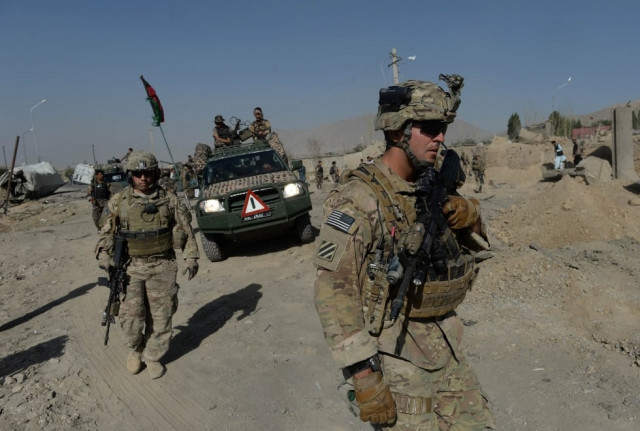Learn from failures in Afghanistan, say experts
Security experts call on civilian govt to take lead on foreign policy

Security experts call on civilian govt to take lead on foreign policy. PHOTO: AFP
The speakers made these deliberations during a seminar on the ‘Changing Geo-strategic Scenario- New Security Challenges for Pakistan’, organised by the Sustainable Development Policy Institute (SDPI) on Monday.
Lieutenant General (retired) Asad Durrani, while commenting on the situation in Afghanistan, pointed out that India was fully exploiting the situation across the Durand Line in its favour.
On the other hand, Pakistan, which had suffered huge losses over the years, has failed to make the world see its compulsions.
He warned that Pakistan could mire itself into new wars by taking on elements which were not focusing on it.
However, he was also of the view that said that since Pakistan has braved pressure from world powers for so long, it should not surrender its principle position on key strategic issues.
But Lt Gen (retd) Talat Masood differed with him.
Covering various aspects of the declaration by five emerging economies of Brazil- Russia-India-China-South Africa (BRICS) and recent policy statements from US President Donald Trump, he said that it was time that Islamabad does some serious soul searching and rethinks its policy of supporting certain militant groups.
Referring to concerns that China had backed the BRICS declaration, Lt Gen Masood recalled that this did not indicate a policy shift from Beijing, rather this was an old stance about certain non-state actors.
However, he stressed that this highlighted a dire need for Pakistan to effectively present its case before global community.
He pointed out that no world power could improve their situation if the state was weakened internally and Afghanistan, as a model of a failed state, was a classic example in this regard.
He suggested that Pakistan’s institutions should learn from Afghanistan and redress issues which were weakening and destabilising Pakistan from within.
Senior political analyst Zahid Hussain said that the American policy on Afghanistan was still quite unclear. As far as Pakistan was concerned, it was disturbing how it had been linked with policy towards South Asia. Hoping things with Washington would resettle gradually, he urged Islamabad to resume engagement with Kabul and fulfil promises made under the Afghan Transit Trade.
Brigadier (retd) Shaukat Qadir criticised the government for failing to devise a coherent and effective foreign policy. He said that China was trying to push its position over the China-Pakistan Economic Corridor (CPEC). However, he warned that Pakistan should be vigilant not to repeat past mistakes of surrendering key interests to favour a global power.
Former ambassador Shafqat Kakakhel said that all stakeholders in the regional security situation must realise that there was no military solution to the turmoil in Afghanistan and that a political settlement was the only answer.
Earlier, Dr Imran Khalid of SDPI presented a detailed outlook of security related challenges to Pakistan in the current scenario.
Published in The Express Tribune, September 12th, 2017.



















COMMENTS
Comments are moderated and generally will be posted if they are on-topic and not abusive.
For more information, please see our Comments FAQ